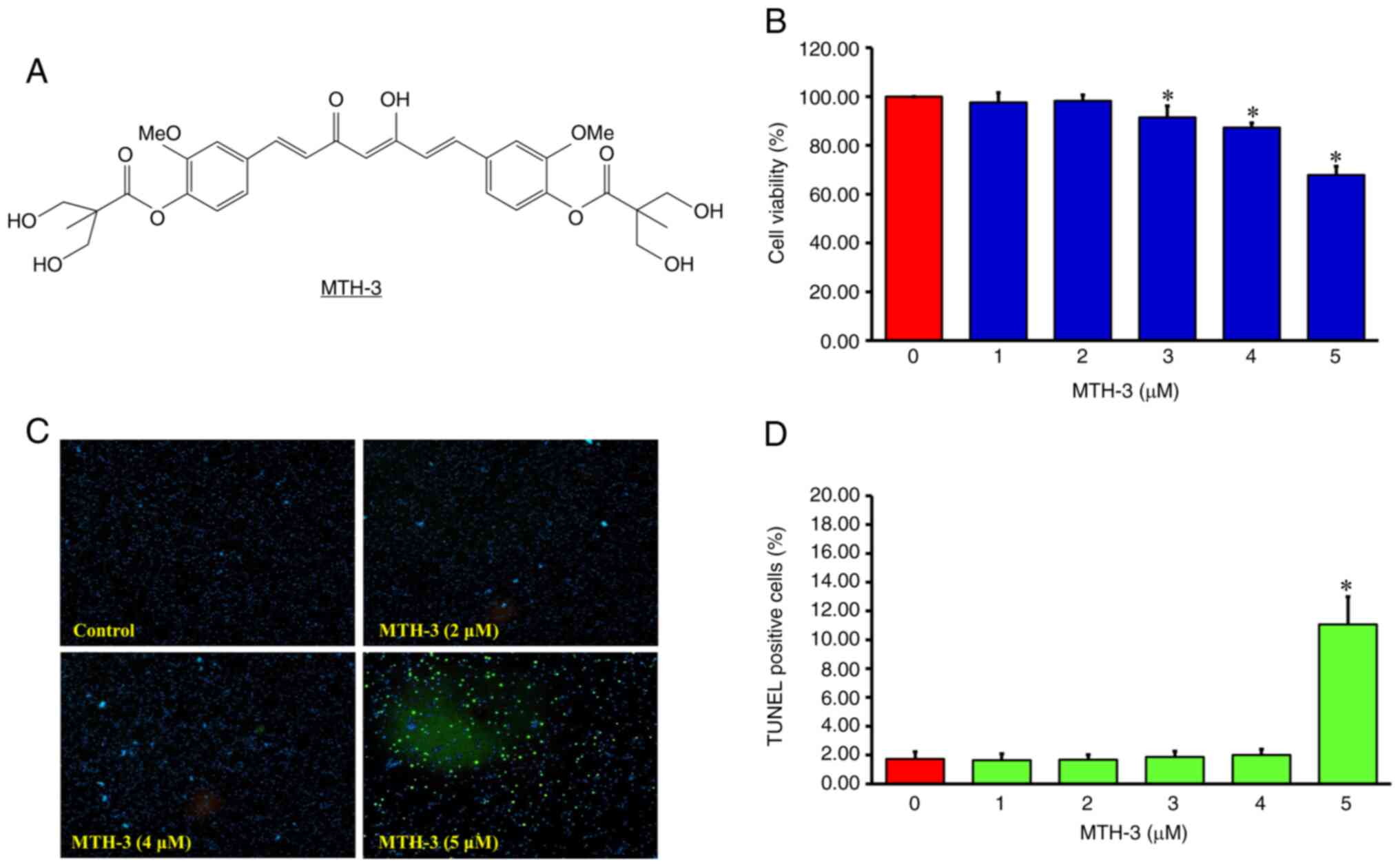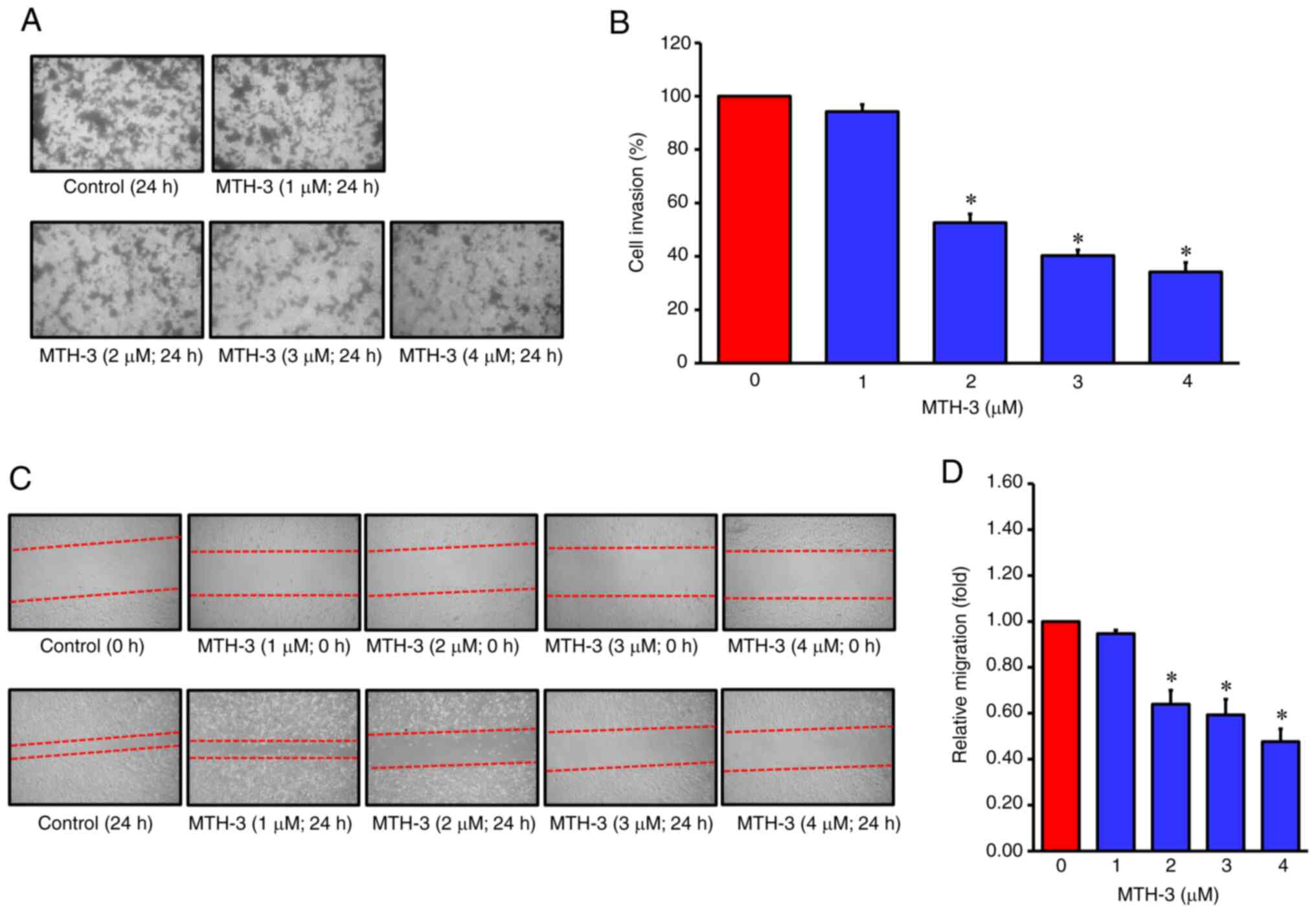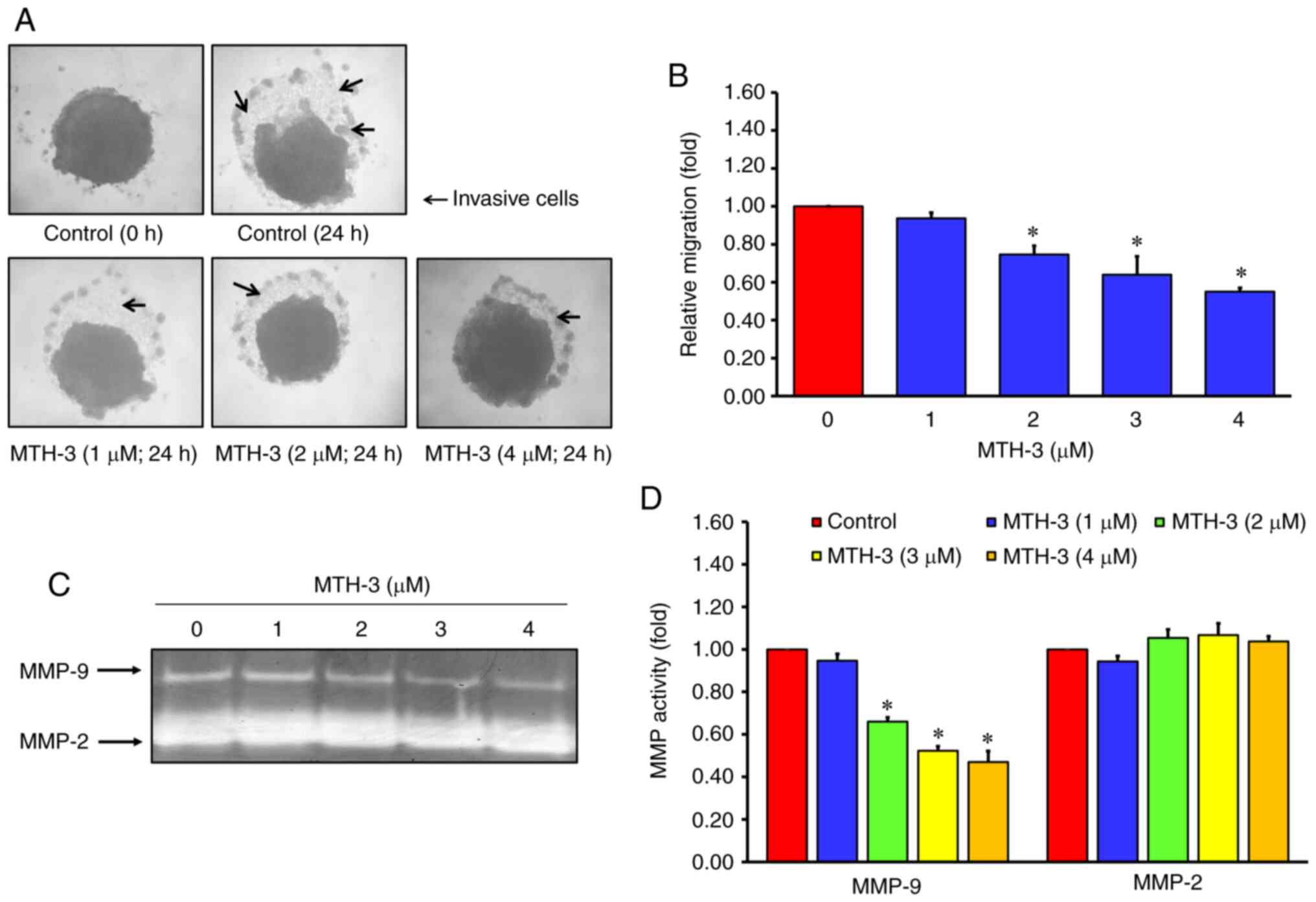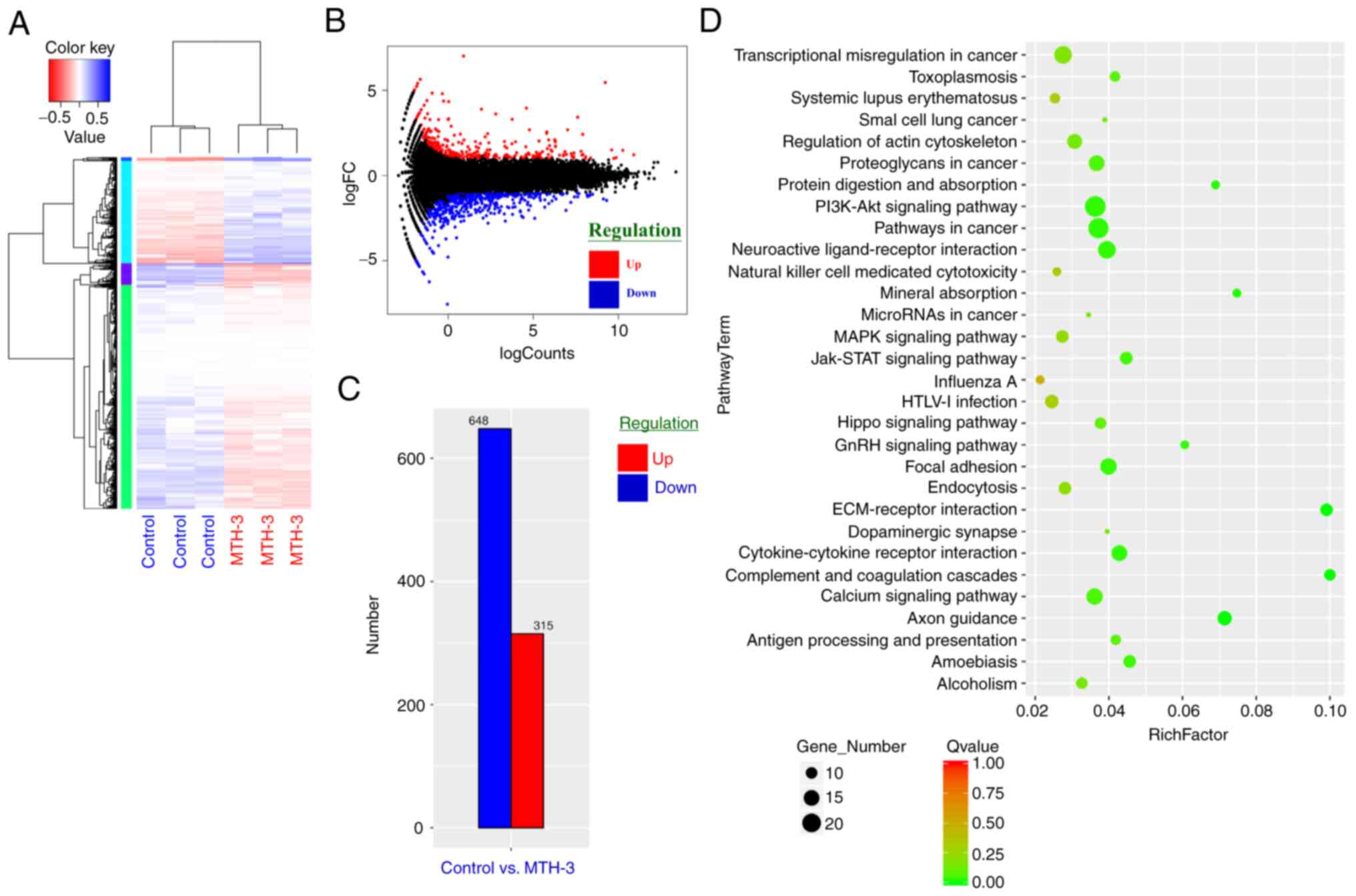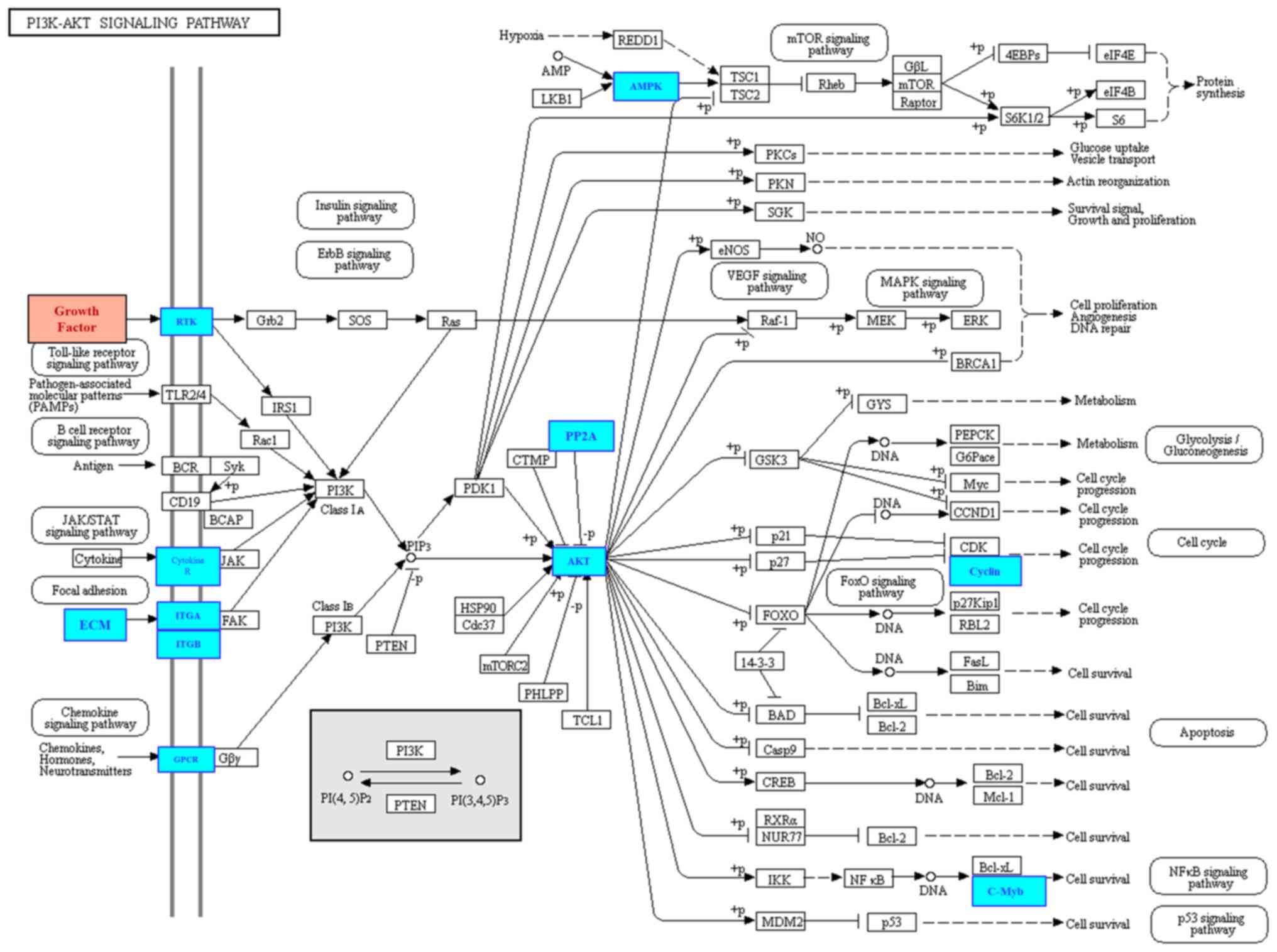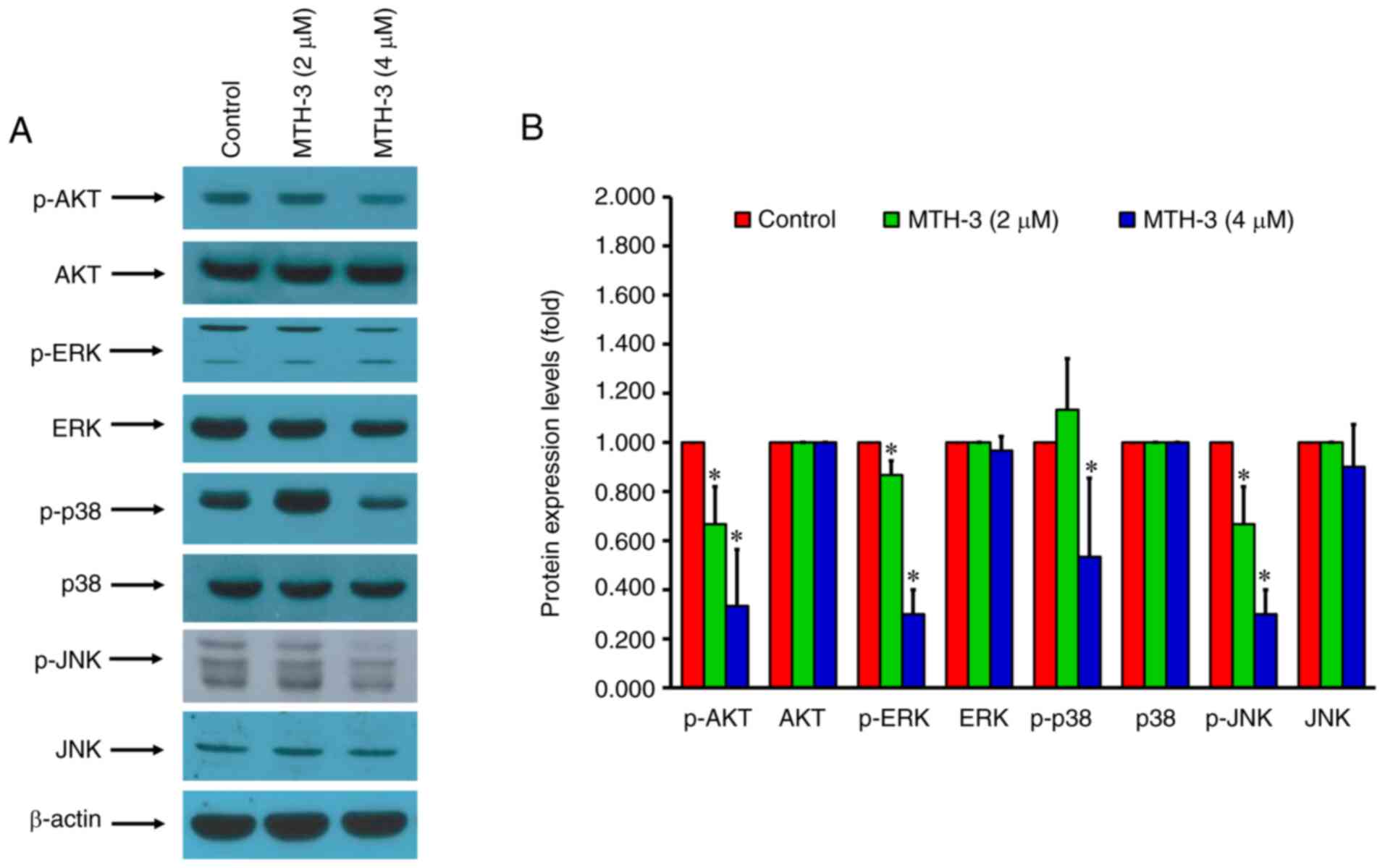|
1
|
McGuire A, Brown JA, Malone C, McLaughlin
R and Kerin MJ: Effects of age on the detection and management of
breast cancer. Cancers (Basel). 7:908–929. 2015. View Article : Google Scholar : PubMed/NCBI
|
|
2
|
Feng Y, Spezia M, Huang S, Yuan C, Zeng Z,
Zhang L, Ji X, Liu W, Huang B, Luo W, et al: Breast cancer
development and progression: Risk factors, cancer stem cells,
signaling pathways, genomics, and molecular pathogenesis. Genes
Dis. 5:77–106. 2018. View Article : Google Scholar : PubMed/NCBI
|
|
3
|
Key TJ, Bradbury KE, Perez-Cornago A,
Sinha R, Tsilidis KK and Tsugane S: Diet, nutrition, and cancer
risk: What do we know and what is the way forward? BMJ.
368:m5112020. View Article : Google Scholar : PubMed/NCBI
|
|
4
|
Wang X, Zhang H and Chen X: Drug
resistance and combating drug resistance in cancer. Cancer Drug
Resist. 2:141–160. 2019.
|
|
5
|
Chen T, Xiong H, Yang JF, Zhu XL, Qu RY
and Yang GF: Diaryl ether: A privileged scaffold for drug and
agrochemical discovery. J Agric Food Chem. 68:9839–9877. 2020.
View Article : Google Scholar : PubMed/NCBI
|
|
6
|
Newman DJ and Cragg GM: Natural products
as sources of new drugs over the 30 years from 1981 to 2010. J Nat
Prod. 75:311–335. 2012. View Article : Google Scholar : PubMed/NCBI
|
|
7
|
Niwa T, Yokoyama Si, Mochizuki M and Osawa
T: Curcumin metabolism by human intestinal bacteria in vitro. J
Func Foods. 61:1034632019. View Article : Google Scholar
|
|
8
|
Yang H, Du Z, Wang W, Song M, Sanidad K,
Sukamtoh E, Zheng J, Tian L, Xiao H, Liu Z and Zhang G:
Structure-activity relationship of curcumin: Role of the methoxy
group in anti-inflammatory and anticolitis effects of curcumin. J
Agric Food Chem. 65:4509–4515. 2017. View Article : Google Scholar : PubMed/NCBI
|
|
9
|
Jing S, Zou H, Wu Z, Ren L, Zhang T, Zhang
J and Wei Z: Cucurbitacins: Bioactivities and synergistic effect
with small-molecule drugs. J Func Foods. 72:1040422020. View Article : Google Scholar
|
|
10
|
Mathew D and Hsu WL: Antiviral potential
of curcumin. J func foods. 40:692–699. 2018. View Article : Google Scholar
|
|
11
|
Zaheri Z, Fahremand F, Rezvani ME,
Karimollah A and Moradi A: Curcumin exerts beneficial role on
insulin resistance through modulation of SOCS3 and Rac-1 pathways
in type 2 diabetic rats. J Func Foods. 60:1034302019. View Article : Google Scholar
|
|
12
|
Tomeh MA, Hadianamrei R and Zhao X: A
review of curcumin and its derivatives as anticancer agents. Int J
Mol Sci. 20:10332019. View Article : Google Scholar : PubMed/NCBI
|
|
13
|
Bondì ML, Emma MR, Botto C, Augello G,
Azzolina A, Di Gaudio F, Craparo EF, Cavallaro G, Bachvarov D and
Cervello M: Biocompatible lipid nanoparticles as carriers to
improve curcumin efficacy in ovarian cancer treatment. J Agric Food
Chem. 65:1342–1352. 2017. View Article : Google Scholar
|
|
14
|
DiMarco-Crook C, Rakariyatham K, Li Z, Du
Z, Zheng J, Wu X and Xiao H: Synergistic anticancer effects of
curcumin and 3′,4′-didemethylnobiletin in combination on colon
cancer cells. J Food Sci. 85:1292–1301. 2020. View Article : Google Scholar : PubMed/NCBI
|
|
15
|
Shehzad A, Wahid F and Lee YS: Curcumin in
cancer chemoprevention: Molecular targets, pharmacokinetics,
bioavailability, and clinical trials. Arch Pharm (Weinheim).
343:489–499. 2010. View Article : Google Scholar : PubMed/NCBI
|
|
16
|
Shanmugam MK, Rane G, Kanchi MM, Arfuso F,
Chinnathambi A, Zayed ME, Alharbi SA, Tan BK, Kumar AP and Sethi G:
The multifaceted role of curcumin in cancer prevention and
treatment. Molecules. 20:2728–2769. 2015. View Article : Google Scholar : PubMed/NCBI
|
|
17
|
Yang KY, Lin LC, Tseng TY, Wang SC and
Tsai TH: Oral bioavailability of curcumin in rat and the herbal
analysis from Curcuma longa by LC-MS/MS. J Chromatogr B
Analyt Technol Biomed Life Sci. 853:183–189. 2007. View Article : Google Scholar : PubMed/NCBI
|
|
18
|
Marczylo TH, Verschoyle RD, Cooke DN,
Morazzoni P, Steward WP and Gescher AJ: Comparison of systemic
availability of curcumin with that of curcumin formulated with
phosphatidylcholine. Cancer Chemother Pharmacol. 60:171–177. 2007.
View Article : Google Scholar : PubMed/NCBI
|
|
19
|
Ma Y, Chen S, Liao W, Zhang L, Liu J and
Gao Y: Formation, physicochemical stability, and redispersibility
of curcumin-loaded rhamnolipid nanoparticles using the pH-Driven
method. J Agric Food Chem. 68:7103–7111. 2020. View Article : Google Scholar : PubMed/NCBI
|
|
20
|
Cuomo F, Perugini L, Marconi E, Messia MC
and Lopez F: Enhanced curcumin bioavailability through nonionic
surfactant/caseinate mixed nanoemulsions. J Food Sci. 84:2584–2591.
2019. View Article : Google Scholar : PubMed/NCBI
|
|
21
|
Hsieh MT, Chang LC, Hung HY, Lin HY, Shih
MH, Tsai CH, Kuo SC and Lee KH: New bis (hydroxymethyl) alkanoate
curcuminoid derivatives exhibit activity against triple-negative
breast cancer in vitro and in vivo. Eur J Med Chem. 131:141–151.
2017. View Article : Google Scholar : PubMed/NCBI
|
|
22
|
Chang LC, Hsieh MT, Yang JS, Lu CC, Tsai
FJ, Tsao JW, Chiu YJ, Kuo SC and Lee KH: Effect of bis
(hydroxymethyl) alkanoate curcuminoid derivative MTH-3 on cell
cycle arrest, apoptotic and autophagic pathway in triple-negative
breast adenocarcinoma MDA-MB-231 cells: An in vitro study.
Int J Oncol. 52:67–76. 2018.PubMed/NCBI
|
|
23
|
Wu KM, Hsu YM, Ying MC, Tsai FJ, Tsai CH,
Chung JG, Yang JS, Tang CH, Cheng LY, Su PH, et al: High-density
lipoprotein ameliorates palmitic acid-induced lipotoxicity and
oxidative dysfunction in H9c2 cardiomyoblast cells via ROS
suppression. Nutr Metab (Lond). 16:362019. View Article : Google Scholar : PubMed/NCBI
|
|
24
|
Lin KH, Li CY, Hsu YM, Tsai CH, Tsai FJ,
Tang CH, Yang JS, Wang ZH and Yin MC: Oridonin, A natural
diterpenoid, protected NGF-differentiated PC12 cells against
MPP+-and kainic acid-induced injury. Food Chem Toxicol.
133:1107652019. View Article : Google Scholar : PubMed/NCBI
|
|
25
|
Ha HA, Chiang JH, Tsai FJ, Bau DT, Juan
YN, Lo YH, Hour MJ and Yang JS: Novel quinazolinone MJ-33 induces
AKT/mTOR-mediated autophagy-associated apoptosis in 5FU-resistant
colorectal cancer cells. Oncol Rep. 45:680–692. 2021. View Article : Google Scholar : PubMed/NCBI
|
|
26
|
Chiu YJ, Hour MJ, Jin YA, Lu CC, Tsai FJ,
Chen TL, Ma H, Juan YN and Yang JS: Disruption of IGF-1R signaling
by a novel quinazoline derivative, HMJ-30, inhibits invasiveness
and reverses epithelial-mesenchymal transition in osteosarcoma U-2
OS cells. Int J Oncol. 52:1465–1478. 2018.PubMed/NCBI
|
|
27
|
Liu SC, Tsai CH, Wu TY, Tsai CH, Tsai FJ,
Chung JG, Huang CY, Yang JS, Hsu YM, Yin MC, et al:
Soya-cerebroside reduces IL-1β-induced MMP-1 production in
chondrocytes and inhibits cartilage degradation: Implications for
the treatment of osteoarthritis. Food Agric Immunol. 30:620–632.
2019. View Article : Google Scholar
|
|
28
|
Vinci M, Box C and Eccles SA:
Three-dimensional (3D) tumor spheroid invasion assay. J Vis Exp.
e526862015.PubMed/NCBI
|
|
29
|
Howes AL, Richardson RD, Finlay D and
Vuori K: 3-Dimensional culture systems for anti-cancer compound
profiling and high-throughput screening reveal increases in EGFR
inhibitor-mediated cytotoxicity compared to monolayer culture
systems. PLoS One. 9:e1082832014. View Article : Google Scholar : PubMed/NCBI
|
|
30
|
Stacchiotti S, Pantaleo MA, Negri T,
Astolfi A, Tazzari M, Dagrada GP, Urbini M, Indio V, Maestro R,
Gronchi A, et al: Efficacy and biological activity of imatinib in
metastatic dermatofibrosarcoma protuberans (DFSP). Clin Cancer Res.
22:837–846. 2016. View Article : Google Scholar : PubMed/NCBI
|
|
31
|
Kim D, Langmead B and Salzberg SL: HISAT:
A fast spliced aligner with low memory requirements. Nat Methods.
12:357–360. 2015. View Article : Google Scholar : PubMed/NCBI
|
|
32
|
Kanehisa M: Toward understanding the
origin and evolution of cellular organisms. Protein Sci.
28:1947–1951. 2019. View Article : Google Scholar : PubMed/NCBI
|
|
33
|
Cheadle C, Vawter MP, Freed WJ and Becker
KG: Analysis of microarray data using Z score transformation. J Mol
Diagn. 5:73–81. 2003. View Article : Google Scholar : PubMed/NCBI
|
|
34
|
Chiu YJ, Yang JS, Hsu HS, Tsai CH and Ma
H: Adipose-derived stem cell conditioned medium attenuates
cisplatin-triggered apoptosis in tongue squamous cell carcinoma.
Oncol Rep. 39:651–658. 2018.PubMed/NCBI
|
|
35
|
Plaimas K, Mallm JP, Oswald M, Svara F,
Sourjik V, Eils R and König R: Machine learning based analyses on
metabolic networks supports high-throughput knockout screens. BMC
Syst Biol. 2:672008. View Article : Google Scholar : PubMed/NCBI
|
|
36
|
Zhang Z, Rui W, Wang ZC, Liu DX and Du L:
Anti-proliferation and anti-metastasis effect of barbaloin in
non-small cell lung cancer via inactivating p38MAPK/Cdc25B/Hsp27
pathway. Oncol Rep. 38:1172–1180. 2017. View Article : Google Scholar : PubMed/NCBI
|
|
37
|
Mirzaei H, Shakeri A, Rashidi B, Jalili A,
Banikazemi Z and Sahebkar A: Phytosomal curcumin: A review of
pharmacokinetic, experimental and clinical studies. Biomed
Pharmacother. 85:102–112. 2017. View Article : Google Scholar : PubMed/NCBI
|
|
38
|
Hoehle SI, Pfeiffer E, Sólyom AM and
Metzler M: Metabolism of curcuminoids in tissue slices and
subcellular fractions from rat liver. J Agric Food Chem.
54:756–764. 2006. View Article : Google Scholar : PubMed/NCBI
|
|
39
|
Vareed SK, Kakarala M, Ruffin MT, Crowell
JA, Normolle DP, Djuric Z and Brenner DE: Pharmacokinetics of
curcumin conjugate metabolites in healthy human subjects. Cancer
Epidemiol Biomarkers Prev. 17:1411–1417. 2008. View Article : Google Scholar : PubMed/NCBI
|
|
40
|
Lu CC, Chen HP, Chiang JH, Jin YA, Kuo SC,
Wu TS, Hour MJ, Yang JS and Chiu YJ: Quinazoline analog HMJ-30
inhibits angiogenesis: Involvement of endothelial cell apoptosis
through ROS-JNK-mediated death receptor 5 signaling. Oncol Rep.
32:597–606. 2014. View Article : Google Scholar : PubMed/NCBI
|
|
41
|
Shimokawa Ki K, Katayama M, Matsuda Y,
Takahashi H, Hara I, Sato H and Kaneko S: Matrix metalloproteinase
(MMP)-2 and MMP-9 activities in human seminal plasma. Mol Hum
Reprod. 8:32–36. 2002. View Article : Google Scholar : PubMed/NCBI
|
|
42
|
Nishio K, Motozawa K, Omagari D, Gojoubori
T, Ikeda T, Asano M and Gionhaku N: Comparison of MMP2 and MMP9
expression levels between primary and metastatic regions of oral
squamous cell carcinoma. J Oral Sci. 58:59–65. 2016. View Article : Google Scholar : PubMed/NCBI
|
|
43
|
Fan L, Zhang Y, Zhou Q, Liu Y, Gong B, Lü
J, Zhu H, Zhu G, Xu Y and Huang G: Casticin inhibits breast cancer
cell migration and invasion by down-regulation of PI3K/Akt
signaling pathway. Biosci Rep. 38:BSR201807382018. View Article : Google Scholar : PubMed/NCBI
|
|
44
|
Palange AL, Di Mascolo D, Singh J, De
Franceschi MS, Carallo C, Gnasso A and Decuzzi P: Modulating the
vascular behavior of metastatic breast cancer cells by curcumin
treatment. Front Oncol. 2:1612012. View Article : Google Scholar : PubMed/NCBI
|
|
45
|
Coker-Gurkan A, Celik M, Ugur M, Arisan
ED, Obakan-Yerlikaya P, Durdu ZB and Palavan-Unsal N: Curcumin
inhibits autocrine growth hormone-mediated invasion and metastasis
by targeting NF-κB signaling and polyamine metabolism in breast
cancer cells. Amino Acids. 50:1045–1069. 2018. View Article : Google Scholar : PubMed/NCBI
|
|
46
|
Gallardo M and Calaf GM: Curcumin inhibits
invasive capabilities through epithelial mesenchymal transition in
breast cancer cell lines. Int J Oncol. 49:1019–1027. 2016.
View Article : Google Scholar : PubMed/NCBI
|
|
47
|
Hu C, Li M, Guo T, Wang S, Huang W, Yang
K, Liao Z, Wang J, Zhang F and Wang H: Anti-metastasis activity of
curcumin against breast cancer via the inhibition of stem cell-like
properties and EMT. Phytomedicine. 58:1527402019. View Article : Google Scholar : PubMed/NCBI
|
|
48
|
Guan F, Ding Y, Zhang Y, Zhou Y, Li M and
Wang C: Curcumin suppresses proliferation and migration of
MDA-MB-231 breast cancer cells through autophagy-dependent Akt
degradation. PLoS One. 11:e01465532016. View Article : Google Scholar : PubMed/NCBI
|
|
49
|
Turro E, Astle WJ, Megy K, Gräf S, Greene
D, Shamardina O, Allen HL, Sanchis-Juan A, Frontini M, Thys C, et
al: Whole-genome sequencing of patients with rare diseases in a
national health system. Nature. 583:96–102. 2020. View Article : Google Scholar : PubMed/NCBI
|
|
50
|
Collado-Torres L, Nellore A, Kammers K,
Ellis SE, Taub MA, Hansen KD, Jaffe AE, Langmead B and Leek JT:
Reproducible RNA-seq analysis using recount2. Nat Biotechnol.
35:319–321. 2017. View Article : Google Scholar : PubMed/NCBI
|
|
51
|
Vamathevan J, Clark D, Czodrowski P,
Dunham I, Ferran E, Lee G, Li B, Madabhushi A, Shah P, Spitzer M
and Zhao S: Applications of machine learning in drug discovery and
development. Nat Rev Drug Discov. 18:463–477. 2019. View Article : Google Scholar : PubMed/NCBI
|
|
52
|
Zhou W, Yui MA, Williams BA, Yun J, Wold
BJ, Cai L and Rothenberg EV: Single-cell analysis reveals
regulatory gene expression dynamics leading to lineage commitment
in early T cell development. Cell Syst. 9:321–337. e9. 2019.
View Article : Google Scholar : PubMed/NCBI
|
|
53
|
Byrne A, Cole C, Volden R and Vollmers C:
Realizing the potential of full-length transcriptome sequencing.
Philos Trans R Soc Lond B Biol Sci. 374:201900972019. View Article : Google Scholar : PubMed/NCBI
|
|
54
|
Zhang Y, Moerkens M, Ramaiahgari S, de
Bont H, Price L, Meerman J and van de Water B: Elevated
insulin-like growth factor 1 receptor signaling induces
antiestrogen resistance through the MAPK/ERK and PI3K/Akt signaling
routes. Breast Cancer Res. 13:R522011. View Article : Google Scholar : PubMed/NCBI
|
|
55
|
Lin CC, Chen KB, Tsai CH, Tsai FJ, Huang
CY, Tang CH, Yang JS, Hsu YM, Peng SF and Chung JG: Casticin
inhibits human prostate cancer DU 145 cell migration and invasion
via Ras/Akt/NF-κB signaling pathways. J Food Biochem.
43:e129022019. View Article : Google Scholar : PubMed/NCBI
|
|
56
|
Chen WC, Lai YA, Lin YC, Ma JW, Huang LF,
Yang NS, Ho CT, Kuo SC and Way TD: Curcumin suppresses
doxorubicin-induced epithelial-mesenchymal transition via the
inhibition of TGF-β and PI3K/AKT signaling pathways in
triple-negative breast cancer cells. J Agric Food Chem.
61:11817–11824. 2013. View Article : Google Scholar : PubMed/NCBI
|
|
57
|
Berrak Ö, Akkoç Y, Arısan ED, Çoker-Gürkan
A, Obakan-Yerlikaya P and Palavan-Ünsal N: The inhibition of PI3K
and NFκB promoted curcumin-induced cell cycle arrest at G2/M via
altering polyamine metabolism in Bcl-2 overexpressing MCF-7 breast
cancer cells. Biomed Pharmacother. 77:150–160. 2016. View Article : Google Scholar : PubMed/NCBI
|
|
58
|
Fusté NP, Fernández-Hernández R, Cemeli T,
Mirantes C, Pedraza N, Rafel M, Torres-Rosell J, Colomina N,
Ferrezuelo F, Dolcet X and Garí E: Cytoplasmic cyclin D1 regulates
cell invasion and metastasis through the phosphorylation of
paxillin. Nat Commun. 7:115812016. View Article : Google Scholar
|
|
59
|
Maldonado MDM and Dharmawardhane S:
Targeting rac and Cdc42 GTPases in cancer. Cancer Res.
78:3101–3111. 2018. View Article : Google Scholar : PubMed/NCBI
|
|
60
|
Stengel K and Zheng Y: Cdc42 in oncogenic
transformation, invasion, and tumorigenesis. Cell Signal.
23:1415–1423. 2011. View Article : Google Scholar : PubMed/NCBI
|
|
61
|
Huang TY, Peng SF, Huang YP, Tsai CH, Tsai
FJ, Huang CY, Tang CH, Yang JS, Hsu YM, Yin MC, et al:
Combinational treatment of all-trans retinoic acid (ATRA) and
bisdemethoxycurcumin (BDMC)-induced apoptosis in liver cancer Hep3B
cells. J Food Biochem. 44:e131222020. View Article : Google Scholar : PubMed/NCBI
|
|
62
|
Body S, Esteve-Arenys A, Miloudi H,
Recasens-Zorzo C, Tchakarska G, Moros A, Bustany S, Vidal-Crespo A,
Rodriguez V, Lavigne R, et al: Cytoplasmic cyclin D1 controls the
migration and invasiveness of mantle lymphoma cells. Sci Rep.
7:139462017. View Article : Google Scholar : PubMed/NCBI
|
|
63
|
Chen K, Jiao X, Ashton A, Di Rocco A,
Pestell TG, Sun Y, Zhao J, Casimiro MC, Li Z, Lisanti MP, et al:
The membrane-associated form of cyclin D1 enhances cellular
invasion. Oncogenesis. 9:832020. View Article : Google Scholar : PubMed/NCBI
|
|
64
|
Du DS, Yang XZ, Wang Q, Dai WJ, Kuai WX,
Liu YL, Chu D and Tang XJ: Effects of CDC42 on the proliferation
and invasion of gastric cancer cells. Mol Med Rep. 13:550–554.
2016. View Article : Google Scholar : PubMed/NCBI
|















